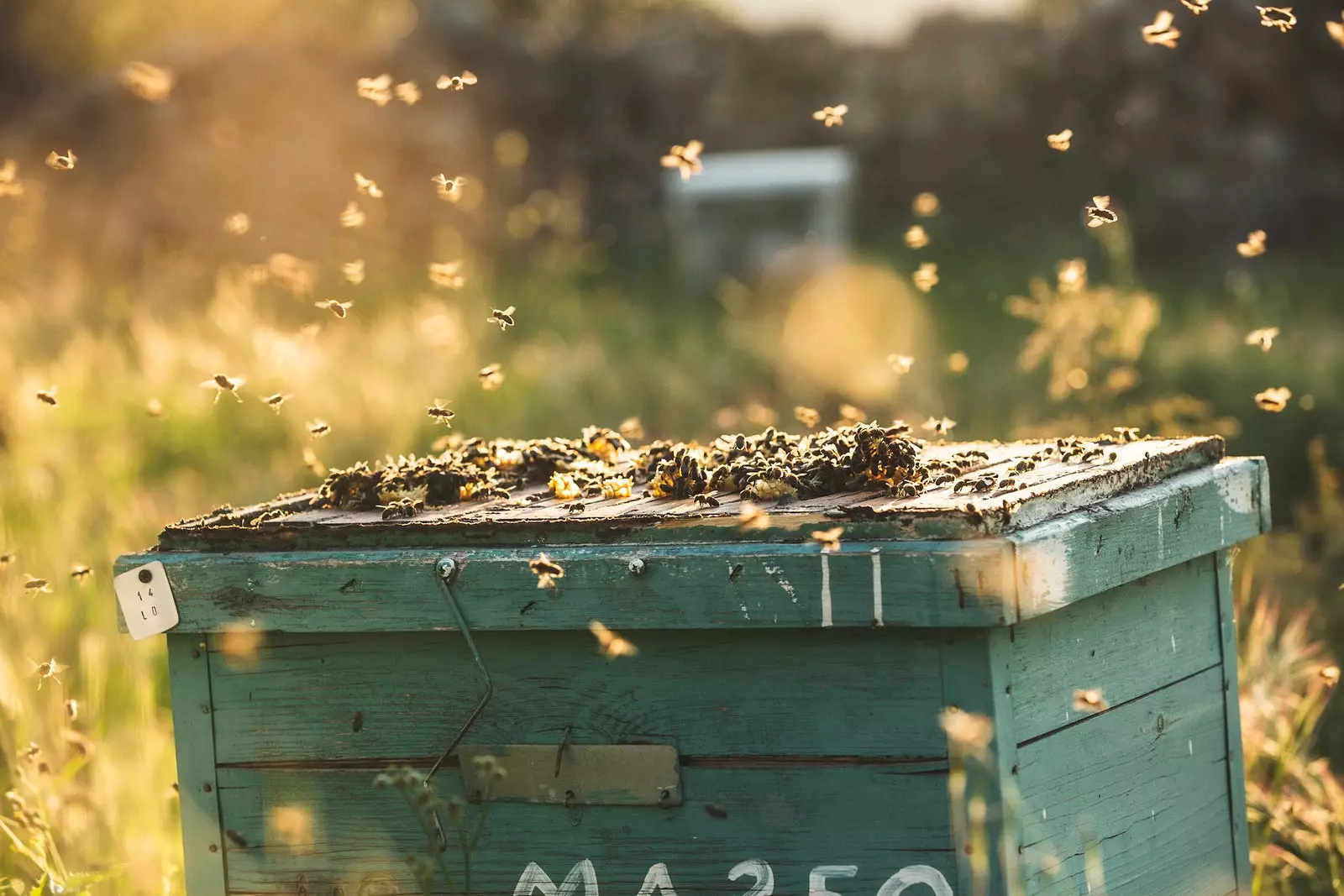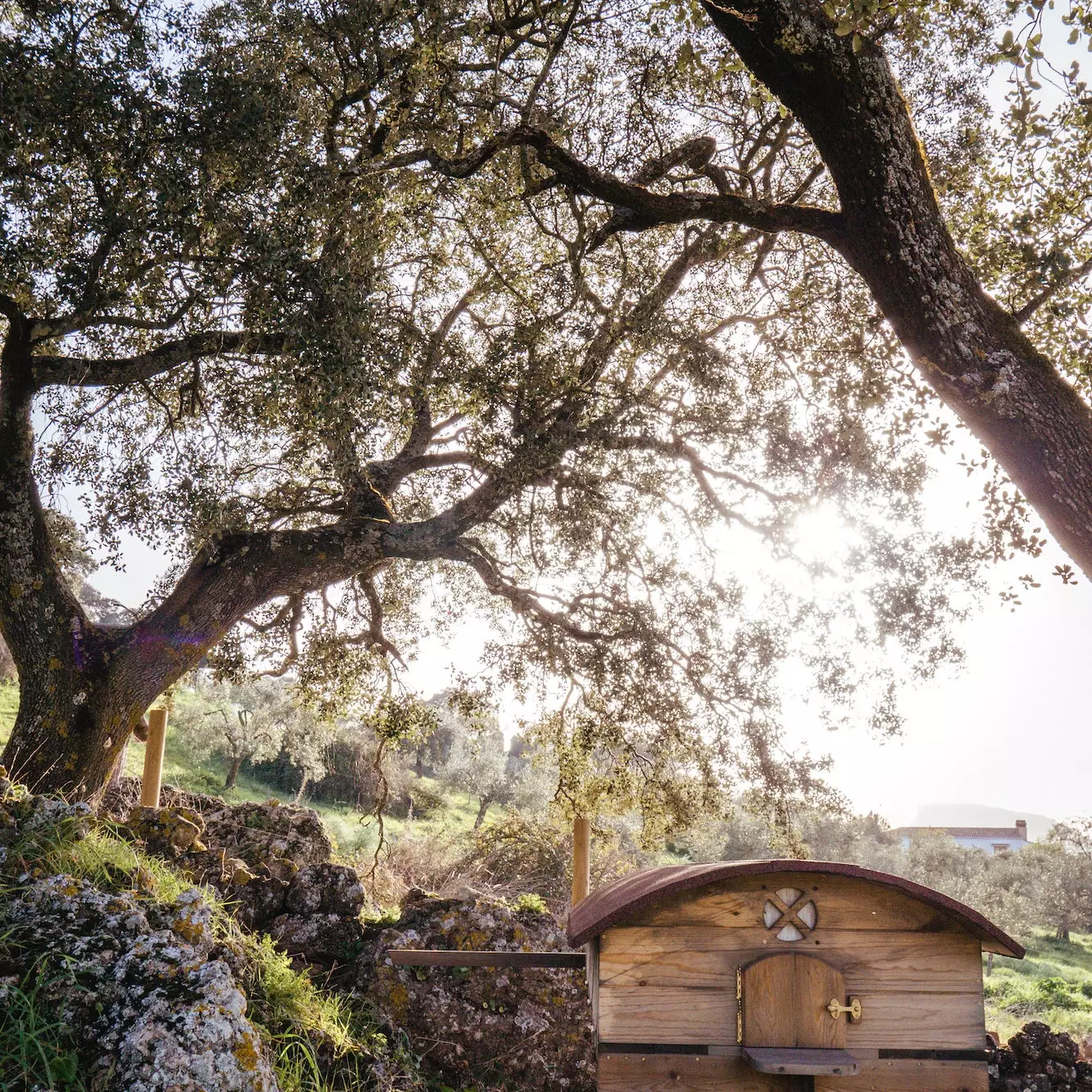
One of the thirty beehives that are scattered around the La Donaira estate, in the Serranía de Ronda, Málaga
Bees are amazing animals capable of producing their own food (honey and royal jelly) and their own medicine (propolis). Also, they are essential for pollination of the field, the flowers, the crops and for The Biodiversity usually.
Yes, if we did not have bees, there would be no agriculture. So the next time a bee buzzes around you, remember that what we eat largely depends on the service that bees and other pollinating insects provide to the ecosystem.
They are so important that the UN decided to grant them a day on the calendar, on May 20, slovenian birth anniversary Anton Jansa, one of the pioneers of modern beekeeping, to make us aware of his role in our survival.
Bees are also considered the thermometer of our society. If the bees are healthy, we are treating the planet well, we are doing it right, everything is in order. But, unfortunately, since the beginning of the 21st century they show symptoms that indicate that something is not working, they are dying much more than in the last century. What's wrong with the bees? Their populations are declining alarmingly and everything indicates that their health status is not adequate, to which is added the increase in the environmental application of insecticides, herbicides and fungicides.
“The problem with bees is that the world we live in has changed. We have forced the planet and any change in the environment affects them: global warming, the expansion of monocultures, the lack of diversity... But the animals adapt splendidly and so do the bees," he says. Aránzazu Meana, Professor of Parasitology and Parasitic Diseases at the Veterinary School of Madrid. "It is clear that all animals are suffering, including insects, however, this has nothing to do with the health problems that our livestock insect faces, Apis mellifera iberiensis.
There are 20,000 species of bees in the world. but when we speak in general we refer to the European Apis Mellifera, the bee honey producer, the livestock, the one that man "cultivates" to obtain a profit.
From them we get honey, royal jelly, pollen, propolis and poison, which is used for different purposes. Spain is the first country in Europe in terms of number of hives and honey production, an activity that has increased around 36% since 2010. Another economic sector derived from bee farming is the one that uses hives to consciously pollinate crops and produce better crops and more bees that do the same. They are not interested in the products of the hive, only the bees. This, unusual in Spain, is normal in countries like the United States, where kilometric extensions of monoculture make it necessary to install hives inside.
BEE PANDEMICS
The great drama of the bees reached a situation of social alarm in America in 2007, when they realized that there were no bees to pollinate the crops. “Farmers and beekeepers threw their hands to their heads. Some because they were left without a harvest and others because they did not have enough hives to rent for this purpose, but the problem had already been detected in Spain several years before, due to the massive hive losses of unknown origin”, recalls the professor.
In those years, the professor's team discovered a new pathogen in Europe, Nosema ceranae, a fungus that was silently spreading across the planet, and that affected the digestive system of bees. Spain took measures in this regard, but very limited as there are no drugs authorized for its control. “Although we have already learned to live with it, this new parasite is present in 70 to 80 percent of all Spanish hives. And it is one of the reasons why, on certain occasions, the hives need some nutritional supplement, especially protein," explains the veterinarian.
And, as if this were not enough, our beekeeping industry had already been fighting for several years with another pandemic of the 20th century, another parasite whose name says it all: Varroa destroyer, a kind of mite that has developed a very sophisticated system to infect bees before they are born. “It multiplies when the bee is undergoing metamorphosis inside its cocoon, isolated from the rest of the hive. "Currently, bees and honey cannot be produced without a sanitary control of Varroa destructor", explains Arantxa, who cannot hide his admiration for such an effective and well-adapted parasite. The lack of control of this parasite leads to its exponential multiplication until in 2-3 years it causes the death of the entire colony. It has been the cause of the disappearance of most of the wild colonies of bees.
The bees are also disoriented. One of the scientifically proven factors is the negative effect of parasites on the physiology of bees, but at the beginning of the 21st century, the possibility of the impact of the proliferation of antennas and the use of mobile phones, which was previously limited, was considered to the cities and has already spread throughout the countryside. However, Aránzazu Meana confirms that **there are no scientific studies that have been able to prove it. **
CONSEQUENCES OF QUARANTINE ON BEES
Regarding the impact that our confinement measures have had on the bee population, Aránzazu, who is in contact with veterinary colleagues from different parts of our geography, informs us that the hives have not been neglected, “since beekeepers, such as ranchers, yes they have had the possibility of movement to attend to them”, he points out. "Right now, the hives are very strong and many tend to swarm, but it is a direct consequence of this hot and rainy spring”. He curiously he has observed a increased presence of solitary bees and pollinating insects “perhaps due to the splendid spring and the lack of maintenance in parks and gardens”.

In La Donaira only the surplus of honey that the bees have left over is collected
THE PAMPERED GIRLS OF LA DONAIRA
Despite this unflattering picture, in Donaira , a biodynamic farm with luxury accommodation in the Serrania de Ronda, Malaga, A unique project in Europe is being carried out to return bees (specifically the Apis Mellifera Iberiensis, an endemic subspecies of the peninsula, considered extinct in the wild) to their natural habitat: the interior of the forest. At the helm of this ambitious rewilding project is the prominent British beekeeper Jonathan Powell, trustee of the Natural Beekeeping Trust (Natural Beekeeping Fund).
“In the last hundred years we have taken away the life they led. Bees like to make their hives high up in trees and we have lowered them to the ground. They like to be quiet and we are constantly going to bother them. They eat the honey they produce and we take it away from them. They need a biodiverse environment and they don't get along with chemicals and we have filled the field with polluted monocultures”, explains Jonathan Powell, whose work, as he humbly sums it up, “just consists of provide the optimal conditions so that the hive is strong and healthy and the bees can do what they have to do.”
In the 700 hectares of La Donaira, where everything is geared towards letting nature take its course without the interference of man, the bees are the spoiled girls.
That means that royal jelly, the queen's food, is not taken away here, and only the excess honey is removed. "Here we only remove honeycombs when the hives are bursting," Vicky Gutierréz Ruíz, responsible for the biodynamic agriculture area of La Donaira, assures us. “Imagine that you come home after a whole day of hard work and they take away the food you brought for you and your family. That's what we do to the bees."
Nor are they fed with sugar, as is usually done in beekeeping. “There are studies that show that sugar damages the intestine and it deactivates some enzymes, the P450, which are used to metabolize toxic chemical substances –such as thiacloprid, one of the neonicotinoids present in the insecticides, herbicides and fungicides with which crops are treated”, warns Johnathan Powell.
The British beekeeper is able to tell what is going on inside a hive just by listening to its buzz. He firmly believes that the place of the bees is in the trees, in the forest, and the results he is getting at La Donaira show that he is not entirely wrong. Since the project began three years ago, they have verified that the hives located in the trees are recovering much more easily than those that remain on the ground, which are more likely to die from Varroa infections.
To bring us closer to the universe of these exceptional creatures, at La Donaira they offer an experience difficult to find almost anywhere else in the world: a meditation on a bed located above the hives.

There are only four bee meditation beds like this in Europe
IN BED WITH THE BEES
"It's like walking back into mom's house" . Paula explains to us what the meditation that she directs consists of and that takes place on a wooden bed placed on two hives. Totally isolated, of course, one hundred percent secure. “The first thing you notice is the smell: sweet and somewhat musky. And incredible peace. Before you lie down, your biorhythms have already started to go down,” she continues. "Being in the dark, sound matters . And, from there, we begin to visualize what is happening inside the hive, below you. You are so comfortable, you feel so protected, that later it is difficult to go out into the outside world”.
The experience, which lasts just over an hour, begins with an infusion in the impressive medicinal garden (they have more than 400 species!), a small ritual to discover details about the life and behavior of these exceptional creatures. If it is harvest season, participants can accompany the beekeeper to collect the surplus honey and observe the entire process.
Although it is not for everyone, to participate in this activity you do not need any previous experience. “Just have an open heart and not create expectations”, Paula assures us, who recommends it to anyone with an interest and desire to know more about bees. "Fear is what always stops us, what prevents us from doing new things."
The goal of this meditation is sound and vibration produced by bees help us to balance our body and connect with their world and, consequently, with the rest of nature. But, beyond living a unique and different experience, what is intended with this meditation is that let's rethink our way of life and we realize that, with small changes, with small behaviors, we can help things work differently.
